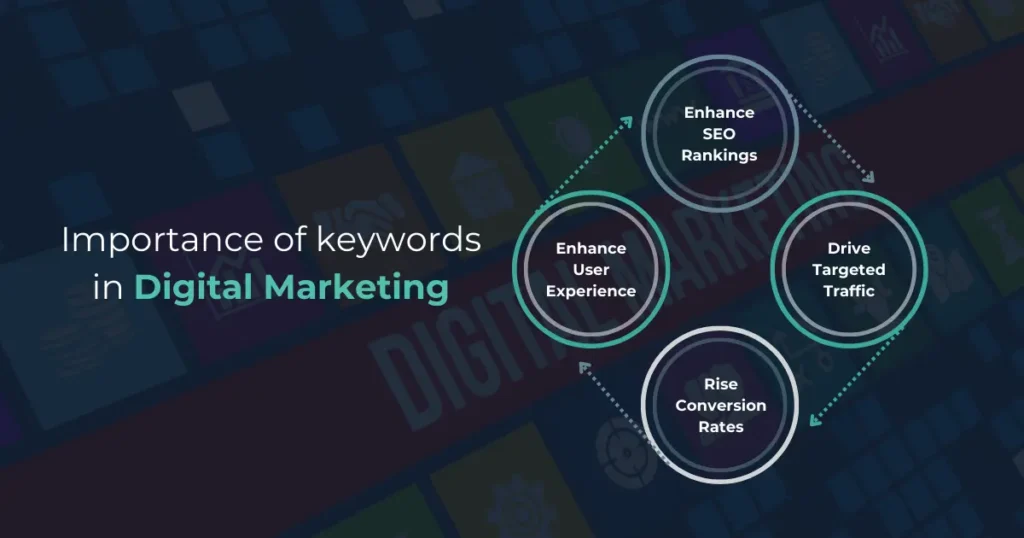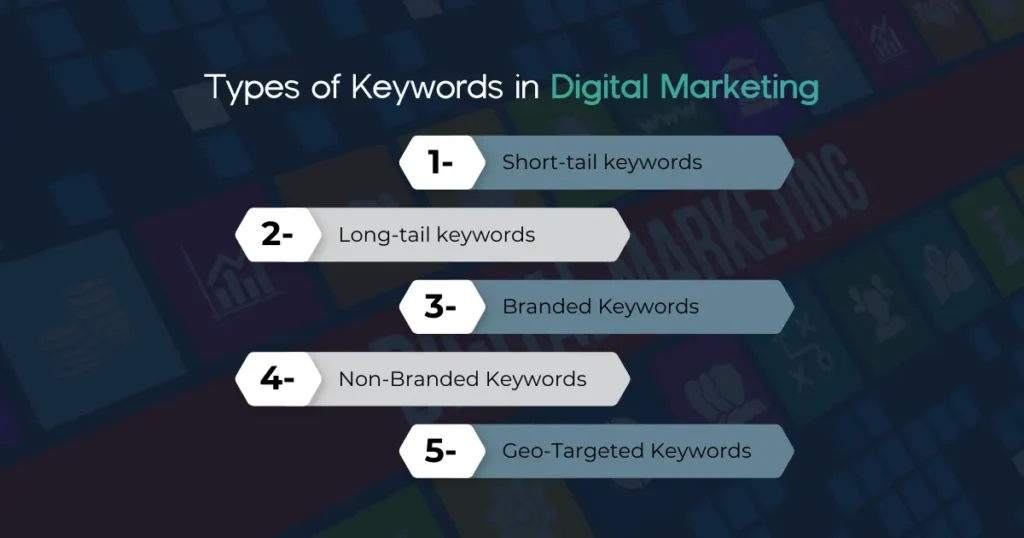Keywords are the key terms users enter into search engines to find the information, products, or services they need. Choosing the right keywords for your website is essential, as it connects what people are searching for with the content you provide.
In this blog post, we explore why keywords are vital to your digital marketing strategy and how they can drive traffic to your site.
Importance of keywords in digital marketing

Keywords are essential for improving online visibility. They help search engines interpret the content of web pages and assess their relevance to a user’s search query.
When keywords are strategically optimized, they can boost a website’s position on search engine results pages (SERPs), making it easier for users to discover and engage with the site. Here are the key benefits of using keywords effectively:
1. Enhance SEO Rankings
Keywords are vital for improving SEO rankings. When organically used in quality content, they help search engines understand a page’s subject and match it with suitable search questions, enhancing the chances of ranking higher on SERPs.
2. Drive Targeted Traffic
Keywords draw targeted traffic to a website. By utilizing keywords that match a specific audience’s appeals and questions, search engines attract more relevant audiences by showing more recent products and services.
3. Enhance User Experience
Valuable keyword use enhances user experience by ensuring that content matches user intent. When users find relevant information quickly, it improves their knowledge, motivates them to stay on the site longer, and reduces bounce rates.
4. Rise Conversion Rates
Targeted keywords can also raise conversion rates. By drawing the right audience and supplying relevant content, businesses can more effectively guide users through the sales funnel, directing them to higher conversions.
Types of Keywords in Digital Marketing

Short-tail keywords
Short-tail keywords are comprehensive and general terms, mainly consisting of one or two words. Due to their high search volumes, they drive a lot of traffic, but it’s high competition and causes lower conversion rates.
Long-tail keywords
Long-tail keywords are longer, more specific phrases, so they have lower search volumes. They attract more targeted traffic and have lower competition, making it easier to rank for them. Their disadvantage is their lower search volumes, which can result in less overall traffic.
Branded Keywords
Branded keywords include a business’s name, which is essential for brand recognition and loyalty. These keywords protect brand identity and ensure the company appears in search results.
Non-Branded Keywords
Use non-branded keywords that do not carry any business or company name to reach a broader audience, attract new customers, and drive traffic from users searching for generic terms related to the business’s industry.
Geo-Targeted Keywords
Geo-targeted keywords include location-specific terms that help businesses to attract customers in specific geographic areas.
LSI Keywords
Latent Semantic Indexing (LSI) keywords mean phrases semantically related to the main keyword. It enhances content relevance and can improve SEO by providing additional context.
Buyer Intent Keywords
- Navigational Keywords find a specific website or page. They often include brand names or specific product names.
- Informational keywords help users to gather information or answers to questions. It is often used in content marketing to attract users in the research phase.
- Transactional keywords indicate intent to purchase.
- Commercial investigation keywords assist users in comparing products or looking for reviews before making a purchase decision.
Steps in Keyword Research
- Goals identification is the first step in keyword research. It involves understanding the business’s aims to develop an effective SEO strategy.
- Keyword brainstorming means designing a list of possible keywords. It also requires team discussions, customer feedback, and competitors’ keyword analysis.
- Analyzing Competitor’s keywords delivers insights into what works in the industry.
- Keyword Research Tools facilitate finding the list of potential keywords. They provide data on search volume, keyword difficulty, and related keywords, helping businesses choose the most effective terms.
Tools for Keyword Research
Multiple tools assist in keyword researching:
- Google Keyword Planner provides keyword ideas and traffic estimations. It helps to find new keywords and comprehend their possible influence.
- Ahrefs offers keyword research with search volume, keyword difficulty, and competitor estimation.
- SEMrush also provides keyword research, competitive analysis, and SEO audits. It helps find beneficial keywords and track keyword performance over time.
- Moz includes keyword research tools with search volume, difficulty scores, and organic CTR data.
Best Practices in Keyword Research
- Keyword Relevance Select the most relevant keywords to meet the audience’s needs, confirming the website provides valuable and relevant information.
- Long-tail keywords are more extended and specific phrases. They usually have low search volumes and keyword difficulty but higher conversion rates.
- Keyword difficulty means how challenging it is to rank for a particular keyword.
- Search volume is the number of searches times a keyword within a specific period. High-search-volume keywords can drive more traffic but are often more competitive.
Common Mistakes in Keyword Research
Ignoring user intent is a common mistake. Keywords should match the intent behind a user’s search. It includes overlooking the importance of long-tail keywords and not updating keywords regularly.
Related: 5 Reasons Why Digital Marketing is Important for Small Business
Conclusion
Keywords are essential in digital marketing, playing a pivotal role in both SEO and PPC strategies. Effective keyword research and implementation significantly boost online visibility, attract targeted traffic, and improve conversion rates, driving overall business success.
FAQs
Keywords are short-tail, long-tail, branded, non-branded, geo-targeted, LSI, and buyer intent.
Short-tail keywords usually contain one or two words with high search volumes but high competition, while long-tail keywords are longer, more specific phrases with lower search volumes but higher conversion rates.
Some of the best tools for keyword research include Google Keyword Planner, Ahrefs, SEMrush, and Moz.
These keywords include location-specific terms that attract consumers in particular geographic areas by enhancing visibility in local search results.

